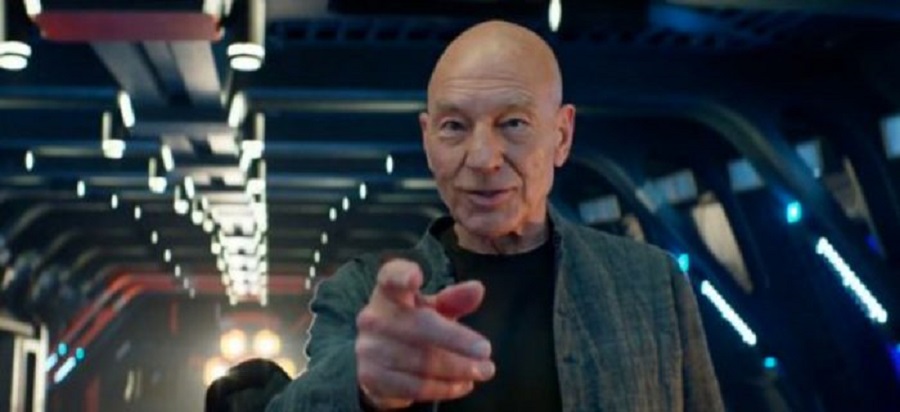This review contains spoilers for Star Trek: Picard, ep 1 “Remembrance”
Over the last decade, reboots, reassembling classic cast members, “legacyquels” and harnessing the nostalgia of well-established intellectual property has become a cornerstone of Hollywood storytelling. Depending on the execution, these projects can span the spectrum from much needed masterpieces to cynical rehashes. Luckily for fans of Star Trek and Patrick Stewart, the pilot of Star Trek: Picard elevates its easy sequel concept, delivering a complex, thoughtful, and original episode that feels full of promise.
Set around 20 years after the events of Star Trek: Nemesis, we find Jean-Luc Picard retired and living on his family vineyard whilst coming to terms with the horrors of his past. His idyllic life in France is shattered when an enigmatic young woman named Dahj (Isa Briones) arrives, desperate for his help after being attacked by masked assailants. What sounds like a simple conceit actually holds a story which surprises, charms, and feels incredibly timely.

CBS
Star Trek has long been built on the core idea of a futuristic utopia, which means that Star Trek: Picard might take some fans a while to get used to. The first episode brings a harder edge to the violence and threat that we expect to see in a Star Trek series, as well as introducing a Federation which is far from the benevolent peacekeepers that they’ve been portrayed as in the past.
In an interesting twist that unites both the classic Star Trek TV show and the contemporary film universe, showrunner Michael Chabon alongside writers Akiva Goldsman, Kirsten Beyer, Alex Kurtzman, and James Duff introduce the Romulan Supernova from the 2009 Star Trek movie and its alternate timeline as a defining event in the prime timeline. The cosmic disaster has waylaid the Federation, Starfleet, and Picard himself. This works as not only a slick way of connecting the two disparate parts of Star Trek canon, but a smart device that sets up a major conflict: the Federation failed to rescue and rehome the Romulans who were displaced by the supernova. This caused Picard to leave Starfleet, disenchanted by their ever more isolationist behavior.
CBS
Director (and Co-Exec Producer) Hanelle M. Culpepper gives the pilot a tangibility and depth that feels miles away from the slick shine of Discovery. Her deft hand shapes the intimate character based story that we get as Picard and Dahj try and solve the mystery of her birth. In an age of often drawn-out “Mystery Box” storytelling, the quick yet satisfying reveal that Dahj is in a synth who was built from the memories and neural net of The Next Generation character Data comes as a refreshing surprise. That’s not to say that Star Trek: Picard gives up all of its secrets in its pilot, though, as it rather lays the groundwork for a great deep-space mystery that centers on Dahj’s creation, her maker, and the possibility that she isn’t the only synth who was crafted from Jean-Luc’s oldest friend.
One of Star Trek: Picard’s biggest surprises is how fresh it feels for a late stage addition to a long running franchise. Star Trek has throughout its decades of history constantly reimagined and rebooted itself, but here we get something that does feel different whilst still consistent with what we’ve seen before. It helps that both Culpepper’s eye and Jeff Russo’s magnificent score feel familiar yet original, painting a more intimate and personal picture of the man now known as Admiral. That careful balance of new and old will be vital going forward as the final act of this episode introduces a shocking new status quo for the Romulans and another age old Federation enemy who are apparently living side by side in an iconic and terrifying location.
Despite once again being banished to the wilds of CBS All Access, Star Trek: Picard is worth watching whether you’re a fan of the franchise or just love good television. It’s a sci-fi story with heart, one that hints at bigger explorations of isolationist governments, political refugees, and even the conversation around sentient artificial life which looks to be at the center of the series. Even though the show feels like it’s bringing something new to the table, it’s still doing what Star Trek does best: using sci-fi to have important conversations and tell stories that might otherwise be ignored.